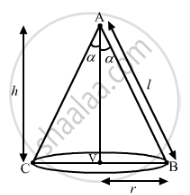Advertisements
Advertisements
प्रश्न
Show that the semi-vertical angle of the cone of the maximum volume and of given slant height is `cos^(-1)(1/sqrt3)`
उत्तर
Let us consider the following variables:
h = height of the cone
l = slant height of the cone (given)
r = radius of the base of the cone
α = semi vertical angle of the cone

Let us assume that V' is the volume of the cone which has to be maximised.
We know that
`V' = 1/3πr^2h ...(1)`
From the figure, we have:
`l^2=r^2+h^2⇒l^2−h^2=r^2`
On substituting the value of r2 in equation (1), we get:
`V' = 1/3π(l^2−h^2)h=1/3π(l^2h−h^3) `
On differentiating with respect to h, we get:
`dV'/dh=1/3π(l^2−3h^2) ...(2)`
For maximum volume of V, let us put `(dV')/(dh)=0.`
So, from equation (2), we have:
`1/3π(l^2−3h^2)=0⇒h=l/sqrt3 (∵ h,l >0)`
Again, differentiating equation (2) with respect to h, we get:
`(d^2V'/dh^2)=1/3π(−6h)=−2πh`
`∴ ((d^2V')/(dh^2))_(h=l/sqrt3)=−2πl/sqrt3<0`
Thus, the volume of the cone is maximum at
`h=l/sqrt3`
From the figure, we have:
`cosα =h/l⇒cosα =l/lsqrt3=1/sqrt3`
`⇒α=cos^(−1)(1/sqrt3)`
∴ The semi-vertical angle is
`cos^(−1)(1/sqrt3). `
संबंधित प्रश्न
Differentiate the following functions from first principles ecos x.
Differentiate tan (x° + 45°) ?
Differentiate log7 (2x − 3) ?
Differentiate \[3^{x \log x}\] ?
Differentiate \[\cos^{- 1} \left\{ 2x\sqrt{1 - x^2} \right\}, \frac{1}{\sqrt{2}} < x < 1\] ?
Differentiate \[\sin^{- 1} \left( \frac{x + \sqrt{1 - x^2}}{\sqrt{2}} \right), - 1 < x < 1\] ?
Differentiate \[\tan^{- 1} \left( \frac{4x}{1 - 4 x^2} \right), - \frac{1}{2} < x < \frac{1}{2}\] ?
Differentiate \[\sin^{- 1} \left( \frac{1}{\sqrt{1 + x^2}} \right)\] with respect to x.
Find \[\frac{dy}{dx}\] in the following case \[x^5 + y^5 = 5 xy\] ?
If \[\tan^{- 1} \left( \frac{x^2 - y^2}{x^2 + y^2} \right) = a\] Prove that \[\frac{dy}{dx} = \frac{x}{y}\frac{\left( 1 - \tan a \right)}{\left( 1 + \tan a \right)}\] ?
Differentiate \[\left( \log x \right)^x\] ?
Differentiate \[\left( \sin x \right)^{\log x}\] ?
Differentiate \[\left( \tan x \right)^{1/x}\] ?
Differentiate \[x^\left( \sin x - \cos x \right) + \frac{x^2 - 1}{x^2 + 1}\] ?
Differentiate \[x^{x \cos x +} \frac{x^2 + 1}{x^2 - 1}\] ?
Differentiate\[\left( x + \frac{1}{x} \right)^x + x^\left( 1 + \frac{1}{x} \right)\] ?
If `y=(sinx)^x + sin^-1 sqrtx "then find" dy/dx`
If \[x^x + y^x = 1\], prove that \[\frac{dy}{dx} = - \left\{ \frac{x^x \left( 1 + \log x \right) + y^x \cdot \log y}{x \cdot y^\left( x - 1 \right)} \right\}\] ?
If \[x^y \cdot y^x = 1\] , prove that \[\frac{dy}{dx} = - \frac{y \left( y + x \log y \right)}{x \left( y \log x + x \right)}\] ?
If \[\left( \sin x \right)^y = \left( \cos y \right)^x ,\], prove that \[\frac{dy}{dx} = \frac{\log \cos y - y cot x}{\log \sin x + x \tan y}\] ?
If \[y = \sqrt{\log x + \sqrt{\log x + \sqrt{\log x + ... to \infty}}}\], prove that \[\left( 2 y - 1 \right) \frac{dy}{dx} = \frac{1}{x}\] ?
If \[y = \left( \cos x \right)^{\left( \cos x \right)^{\left( \cos x \right) . . . \infty}}\],prove that \[\frac{dy}{dx} = - \frac{y^2 \tan x}{\left( 1 - y \log \cos x \right)}\]?
Find \[\frac{dy}{dx}\], when \[x = a t^2 \text{ and } y = 2\ at \] ?
Find \[\frac{dy}{dx}\] ,when \[x = \frac{e^t + e^{- t}}{2} \text{ and } y = \frac{e^t - e^{- t}}{2}\] ?
Differentiate \[\tan^{- 1} \left( \frac{x - 1}{x + 1} \right)\] with respect to \[\sin^{- 1} \left( 3x - 4 x^3 \right), \text { if }- \frac{1}{2} < x < \frac{1}{2}\] ?
If \[f'\left( 1 \right) = 2 \text { and y } = f \left( \log_e x \right), \text { find} \frac{dy}{dx} \text { at }x = e\] ?
If \[x = a \left( \theta + \sin \theta \right), y = a \left( 1 + \cos \theta \right), \text{ find} \frac{dy}{dx}\] ?
If \[x^y = e^{x - y} ,\text{ then } \frac{dy}{dx}\] is __________ .
If x = sin t and y = sin pt, prove that \[\left( 1 - x^2 \right)\frac{d^2 y}{d x^2} - x\frac{dy}{dx} + p^2 y = 0\] .
If p, q, r, s are real number and pr = 2(q + s) then for the equation x2 + px + q = 0 and x2 + rx + s = 0 which of the following statement is true?
